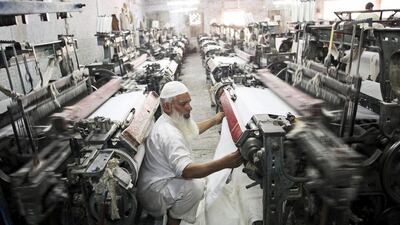Pakistan has won a much-valued tariff status from the European Union – but the question is whether the country is ready to exploit the opportunity at a time when its industry, and especially its textile sector, is adversely hit by serious problems.
Last week, the EU parliament approved the Generalised System of Preference (GSP) Plus status with 409 to 180 votes for 10 developing countries. Pakistan had fought a 10-year campaign in Brussels to win the classification.
With GSP Plus status, the country will get duty-free access to the EU markets, bringing an estimated US$1 billion annually for the South Asian nation. Before the grant of GSP Plus, the importers of Pakistani textile products in the EU had to pay 11 per cent duty, but now they will pay zero tariffs for 20 per cent of Pakistani exports and import 70 per cent of products at preferential rates.
Textile and leather products, ethanol and plastics are the key sectors that will benefit.
Pakistan’s textile and clothing industry, which accounts for two-thirds of its exports, is currently in troubled waters. The industry is the country’s largest manufacturer, exporter and the highest earner of foreign exchange reserves.
After being awarded GSP Plus status, Pakistani exporters hope to double textile exports to $26bn annually.
But whether Pakistan is ready to exploit its Brussels triumph is another matter.
Chronic energy shortages, the high cost of doing business and worsening law and order has already caused a large number of manufacturing units to close. Many industrialists have shifted their factories to Bangladesh and Dubai.
The energy crisis poses a grave challenge to Islamabad’s plan to benefit from EU trade concessions. The textile industry suffered continuous closures and subsequent unemployment, pushing more people below the poverty line over the past five years.
The shutdown of many weaving mills with gas-powered machinery has significantly dropped the demand from dyeing mills for grey cloth.
An increase in textile exports largely depends on adequate supplies of gas and electricity to the sector, which has been hit by an extreme shortage of natural gas. The government has ruled the textile industry will get gas for only two days a week.
The crippling energy shortage continues to cause huge production losses to the entire textile chain, from spinning to finished goods. Many mill owners have already sold their operations to scrap dealers because of the energy crisis and unaffordable electricity tariffs. Investors are losing interest in the sector, which directly provides jobs to 3.5 million people.
The power crisis is the key reason behind industrialists’ frustrations, and they are looking to other countries for setting up their units. Many industrialists moved their factories to Bangladesh or are opening up additional manufacturing units there. Bangladesh offers uninterrupted power supply, cheaper labour costs, comparatively cheaper electricity, higher profit margins and tariff-free access to the EU markets.
Another major challenge is security. Pakistan is virtually under attack from terrorist groups. Growing terrorism poses a threat to exports and much else.
A country’s business community in trouble reflects an economy in troubled waters. This is exactly the case with Pakistan, where a businessman can lose his life just for doing his job.
Executives have to pay money to extortionists to be able to run their operations in Karachi, the country’s industrial and business hub. Many businessmen have been killed for not paying up, and many have moved their manufacturing units abroad.
The government’s efforts to crack down on the criminals in Karachi has so far not produced the desired results.
The private sector has also not been able to play its full part as an engine of growth because of the government’s tight monetary policy, and this has dealt a severe blow to the ailing industrial sector.
Last month, the central bank raised its benchmark interest rate to 10 from 9.5 per cent.
High borrowing costs continue to discourage the demand for private-sector credit, which, in turn, hit investment. Interest rate rises affect all industrial and export-oriented sectors, damaging the investment climate. The rate increase raises the cost of production at a time when Pakistan has comparatively low productivity compared with India, Bangladesh and Sri Lanka – its main competitors in EU markets.
But if uninterrupted gas and electricity supply is ensured by the government, Pakistan will benefit from EU trade concessions. Similarly, the government needs to provide cheap credit to manufacturers to enable them to expand their business and create jobs for the unemployed.
The government should provide globally competitive interest rates on short and long-term loans to the entire textile value chain. Moreover, an improved law and order situation will ensure a sustained industrial growth and lure more investment to the country.
Syed Fazl-e-Haider (www.syedfazlehaider.com) is a development analyst in Pakistan. He is the author of many books, including The Economic Development of Balochistan, published in 2004

